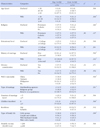Abstract
Purpose
This study was conducted to examine the effects of a marital relationship enrichment program on communication, conflict resolution and marital satisfaction in multicultural couples.
Methods
A quasi-experimental study with a non-equivalent control group pre-post test design was used. Participants were sampled from couples registered at 2 local centers and 2 multicultural family support centers in Seoul and Gyeonggi Province. Sixteen pairs each were randomly assigned to the experimental or control group. The experimental group received the marital relationship enrichment program for 120 minutes/session/week for 6 weeks. Data were analyzed using χ2-test, Fisher's exact test, Mann-Whitney U test, and t-test for subject homogeneity verification, and ANCOVA to examine the hypotheses.
Results
Communication and marital satisfaction increased significantly after the program in experimental group compared with control group. Among conflict solution styles, collaborating and compromising increased and avoiding decreased significantly after the program in the experimental group. Competing decreased significantly after the program for wives in the experimental group. Accommodating did not change significantly in either experimental or control groups.
Figures and Tables
References
1. Ahn JH, Cho JH. Psychosocial and cultural predictors of acculturative stress among marriage immigrant women in the Chungcheongnam-do area of Korea. Korean J Fam Welf. 2011. 32:137–176.
2. An HJ. Home violence experiences of immigrant women who married a Korean man through international marriage and those women's reaction to the violence. 2006. Busan: Silla University;Unpublished master's thesis.
3. Bienvenu SM. Measurement of marital communication. Fam Coord. 1970. 19:26–31.
4. Butterworth P, Rodgers B. Mental health problems and marital disruption: Is it the combination of husbands and wives' mental health problems that predicts later divorce? Soc Psychiatry Psychiatr Epidemiol. 2008. 43:758–763.
5. Byun MH, Kang KJ. Factors of married couples influencing the marital satisfaction of wives in multicultural families. Korean J Fam Welf. 2010. 15:127–141.

7. Hong DA, Chae OH. Family life and conflicts of female international marriage migrant. J Korean Living Sci Assoc. 2006. 15:729–741.

9. Im GH. Study on the social welfare alternatives for the problems of interracial marriages. 2004. Daegu: Daegu University;Unpublished master's thesis.
10. Wood JJ, Repetti RL, Roesch SC. Divorce and children's adjustment problems at home and school: The role of depressive/withdrawn parenting. Child Psychiatry Hum Dev. 2004. 35:121–142.
11. Jon MK. A research and study on the actual life's condition of Korea foreign housewives. 2005. Seoul: Hankuk University of Foreign Studies;Unpublished master's thesis.
12. Jung HM. Domestic violence against immigrant women and its preventing system. Ewha J Gend Law. 2010. 1:71–102.
13. Kang LL. Effects of ENRICH program on self-esteem, depression, marital communication, conflict solution styles and marital adjustment in low-income couples. 2010. Seoul: Catholic University of Korea;Unpublished doctoral dissertation.
14. Kim HS. The development of marital education program for conflict couples. 2004. Changwon: Kyungsung University;Unpublished doctoral dissertation.
15. Kim HS. Impacts of social support and life satisfaction on depression among international marriage migrant women in Daegu and Kyungpook area. J Korean Acad Psychiatr Ment Health Nurs. 2011. 20:188–198.
16. Kim IS. Social work with families & healing spirituality. 2007. Seoul: Hakmun Publishing.
17. Kim SG, Kim YG, Cho EJ, Kim HR, Lee HG, Seul DH. 2009 An investigation of multicultural families. 2010. Seoul: Ministry of Gender Euality & Family.

18. Knudson RM, Sommers AA, Golding SI. Interpersonal perception and mode of resolution in marital conflict. J Pers Soc Psychol. 1980. 38:751–763.

19. Kong SS. A marital relationship enrichment program for couples: Randomized controlled trial. J Korean Acad Nurs. 2005. 35:991–1003.
20. Kwon BS, Cha BH. The impact of communication and cultural identity on marital satisfaction among Kosian housewives in rural areas. Korean J Soc Welf. 2006. 58:109–134.
21. Shin GH, Yang SE. Marital conflicts of intermarried families in Korea. J Korean Home Econ Assoc. 2006. 44(5):1–8.
22. Sin HC, Choi JA. The development and effectiveness of a marital counseling program for multi-cultural families in urban areas. 2011. In : Korean Psychology Association International Conference 2011; 186.
23. Son JY, Baik KI. The efficiency of couple program for marriage immigrant family in Gyeongju. Gyeongju Study. 2008. 17(2):5–34.

24. Song SH, An HJ. Experience of child-rearing of filipino married immigrant women. J Korean Acad Psychiatr Ment Health Nurs. 2011. 20:167–179.

25. Statistics Korea. Vital statistics of immigrants in Korea. 2011. Daejeon: Author.
27. Uhm DC. Effects on couples' communication, intimacy, conflict and quality of life by foot massage between immigrants. J Korean Acad Nurs. 2010. 40:493–502.
28. Whitton SW, Rhoades GK, Sanely SM, Markman HJ. Effect of parental divorce on marital commitment and confidence. J Fam Psychol. 2008. 22:789–793.




 PDF
PDF ePub
ePub Citation
Citation Print
Print







 XML Download
XML Download